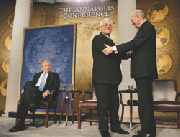BEIRUT — The Middle East peace gathering at Annapolis, Maryland, Tuesday was full of lofty rhetoric, some intriguing new promises, a few bold commitments and a tantalizing cast of characters — alongside plenty of rehashed old rhetoric, rigid positions and regurgitated failed diplomatic mechanisms. It left us with as many questions as answers about whether this is a serious Arab-Israeli peace-making endeavor, or a hoax garnished with Chesapeake Bay clam cakes. Annapolis the-day-after looks remarkably like the-day-before, because we can only judge it once the substantive negotiations start. It was impressive to see so many leaders and officials sincerely seeking a breakthrough for permanent peace on the single most important, radicalizing and destabilizing issue in the Middle East: the Arab-Israeli conflict. A few dramatic new twists were evident — like renewed American engagement, Saudi and Syrian participation and a pledge to work diligently to finalize a peace agreement within one year. These were largely neutralized, however, by lofty but vague rhetoric, and a slightly desperate resort to discredited diplomatic processes that have repeatedly — and catastrophically — failed in the past 16 years, since the 1991 Madrid peace conference. The Annapolis process needs time to reveal if it will succeed or fail — with the real test yet to come in the form of the hard bargaining on the core issues of refugees, settlements, Jerusalem, borders and security. Ehud Olmert and Mahmoud Abbas offered nothing new and suggested a minimal will to compromise on their entrenched positions. The joint understanding between the parties and President Bush’s speech are more significant, but equally problematic. The joint statement does not specifically refer to U.N. resolutions as the reference points for a resolution of the conflict, which was the case in all previous serious peace-making attempts at Madrid, Oslo, Taba, and Camp David. Instead, it makes the United States the judge and arbiter of both sides’ compliance with the “roadmap” requirements. The U.S. has played this monitoring role before, and failed spectacularly. Its past failure was due to a combination of pro-Israeli bias, structural diplomatic incompetence, chronic insincerity and weak resolve. It will be important to see if any of these conditions have changed. We should know within a few months at most. The United States has not proved to be an impartial, persistent or effective mediator in the Middle East since the mid-1970s (unlike in Northern Ireland, where it performed brilliantly and helped bring that conflict to an end). Washington’s commitment, in the 2005 Bush letter to Ariel Sharon, supporting Israel’s views on borders, settlements and refugees would seem to disqualify it from its new self-appointed role as impartial compliance monitor, mediator and arbiter.
Bush’s references to Israel as the homeland of the Jewish people also brings the United States down on the Israeli side of the current tug-of-war about whether Israel is a Jewish nation or the state of all its people, including one-fifth of its citizens who are non-Jewish Christian and Muslim Arabs. A “Jewish state” would also seem to imply that no compromise deal could be reached on the repatriation of any Palestinian refugees, as required by U.N. resolutions. Making the 2003 “roadmap” a centerpiece of the diplomatic path ahead is deeply unimpressive. The roadmap — and its supervising Quartet (the United States, E.U., U.N., Russia) — has proven to be hollow, ineffective, and unrealistic. For the Annapolis parties to commit again to implementing moves on the ground that they have previously and repeatedly failed to implement is amateurish diplomacy. The roadmap in any case is not a balanced and clear document. It has been interpreted in very different ways by Israelis and Palestinians on key issues, such as settlement expansion and terrorism, which partly explains why it was never implemented. If the US- and Israeli-dominated Quartet collectively was a failure, the United States as lone supervisor will almost certainly prove to be worse — especially during an American presidential election year when slightly hysterical pro-Israeli expressions are the order of the day. The commitment to negotiate tirelessly and try to achieve a full peace accord within a year is valiant, but romantic, in view of the huge differences on core issues that have to be negotiated. Neither side has signaled any tangible willingness to make the crucial concessions needed for a full and lasting peace. They are also both constrained by serious domestic political opposition. Annapolis looks dangerously like the 2000 Camp David II negotiations all over again, when a time-pressed Bill Clinton rushed Arabs and Israelis into a negotiation they were not prepared for and were not politically able to deliver on. A majority of Palestinians and Israelis want a negotiated peaceful resolution of their conflict, and are prepared for serious, reciprocal compromises. Sadly, Annapolis seems to confirm again, neither side has been able to generate the bold, quality leadership that is required to mobilize public support to achieve such a peace. A decisive, constructive shift in American, Arab and European external engagement in the negotiations could rescue this precarious process.
Rami G. Khouri is an internationally syndicated columnist, the director of the Issam Fares Institute at the American University of Beirut, editor-at-large of the Beirut-based Daily Star, and co-laureate of the 2006 Pax Christi International Peace Award. ©2007 Rami G. Khouri / Agence Global






Leave a Reply